Assam Times: First of all could you please tell us how you spent your early life in Assam and also how you shift to Europe.
I was born and brought up at Jorhat. I attended the lower primary school at Jorhat and then joined the Jorhat Government High School. From Jorhat my father was transferred to Kohima. He was the Principal of Kohima Polytechnic School. I had my matriculation from Kohima Government High School and did my undergraduate study at J.B. College Jorhat. From there I went to study Aircraft Maintenance Engineering at Southern College of Engineering and Technology in Ernakulum in Kerala. The college selected me to join BMW Triebwerkbau GmbH, in Munich, Germany for higher training in Jet Engines. Before I went to Germany, I joined Kalinga Airlines and worked as a trainee. Here I got my first hand experience in DC3, Dakota aircrafts. For few months, I worked as a teacher at the Kohima Government High School. In November 1963, I left Bombay by ship and after 14 day-long travel reached Genoa in Italy. From there we took the train and travelling through Switzerland we arrived in Munich in one of the coldest winters of Europe. In Germany, I not only got my training in Jet-engines but I also leant how to survive in an alien environment, amidst a totally different work culture and above all without knowing the local language. Anyway I survived. From Munich I went to Hamburg to work with the Lufthansa German Airlines. There I came in contact with numerical controlled machines and data processing. I joined evening classes to study computer programming in languages like Basic, Cobol, Fortran, Algol, etc. and IT Management.
In Germany I wanted to change my profession from Aircraft Maintenance Engineering to IT. But I could not get the residence permit to work in the IT sector. So through a “Head Hunter”, I applied for an IT job in the Netherlands and moved to the Netherlands in 1968.
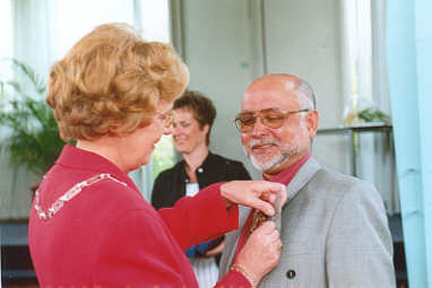
Saleh with the mayor of Berkel en Rodenrijs receiving his royal award. Photo by Hoffman
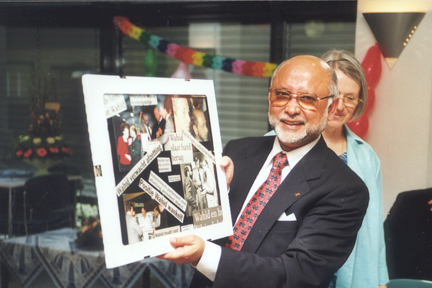
25 years jubilium with the same company. A present received from his collogues. In the bacground his wife Hannie.
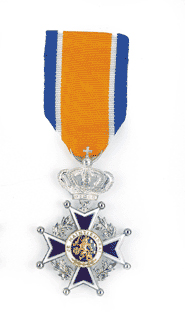
Ridder Oranje Nassau_The medallion
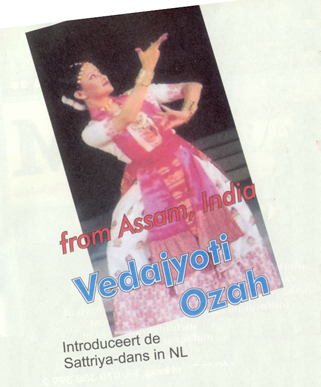
Flyer introducing Sattriya dancer Vedajyoti Ozah. Milan Festival, The Hague, July 2007
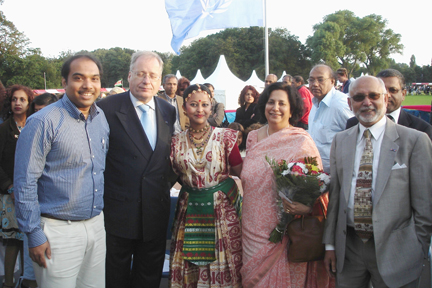
Milan 2007: with Sattriya dance participants at Milan Festival, The Hague, July 2007
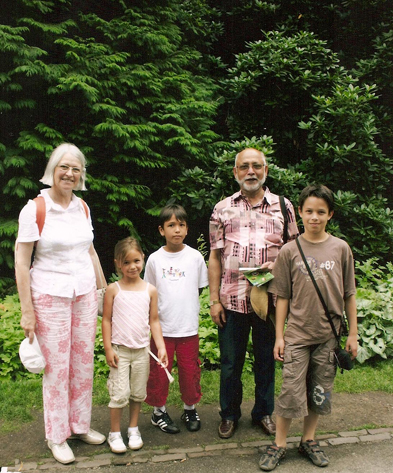
Grandchildren with the grandparents
AT: Why you applied for a job in Netherlands?
One of the reasons I applied for a job in the Netherlands was that as a student from India I was corresponding with a medical student from the Netherlands and she wanted to continue her study to become a medical specialist.
AT: You are the first one of the Assamese to be sent for training in Jet engines. Now tell us how did your career progress?
In those days in India we had aircrafts with propeller driven engines. I remember the Lockheed Constellation, affectionately known as the "Connie", or Super Connie. It was a four-engine propeller-driven aircraft built by Lockheed. Then there was the turbo-prop Fokker’s Friendship aircrafts used in the Kolkata – Assam sector. The Boeing 707 entered commercial services in 1958. Air India introduced the first 707 with jet engines in 1960. At that time there was no possibility in India to get training in commercially used Jet engines. If I remember correctly, in those days, there were only two institutions in India to study Aircraft Maintenance Engineering. One was at Dumdum airport and the other was at Kerala. One of the newspapers published from Kolkata, reported that I was the first Assamese to be sent for training in Jet engines. As India introduced commercial aircrafts with Jet engines in 1960, it is very well possible that I was the first Assamese who got an opportunity to go abroad for higher training in this subject.
AT: How your inclination to work in social activities in Netherlands start?
In comparison with Germany, life in the Netherlands was very comfortable. In the aircraft maintenance division of an airline, some of the employees have to follow a three shifts rooster. In such an environment it is not that easy to follow evening and weekend classes. But I managed. In the Netherlands, it was a job with normal office hours. Another big advantage in the Netherlands was that almost everybody here speaks English.
As a new arrival I got in touch with the Netherlands-India Association. It is one of the oldest cultural associations of the Netherlands, established in April 1954. I became an active member and then got elected to the Board. During this period I came in contact with the diplomats of the Indian Embassy and other India centric organizations. I got involved with different social and cultural organizations and started my contacts with the Dutch local and central government offices. Slowly Indians discovered the Netherlands and started coming to the Netherlands. The new arrivals wanted information about Indian shops, Indian institutions, Hindu temples etc.
The Dutch got interested in yoga and Indian classical music. India was suddenly in. The Dutch school students also got interested in India. The Dutch public contacted me for information. If the Indian Embassy was not able to give answer to questions, they directed the public to contact me. Later the Indian Tourist Office also started informing the public to contact me with their specific questions. That is how I got involved with the socio-cultural activities in the Netherlands. I started writing down the questions and also the answers. This was the foundation of my book called Indiawijzer (Guide to India) which was first published in 1992. It was a small book of 142 pages. The profit of the first edition of the publication, I donated to the Netherlands-India Association. The second edition was published in 1999. It was a book of 412 pages. The profit of this edition, I donated to an educational foundation from Assam. I am now more or less a walking information source on India related subject and a linking pin between different organizations and India.
AT: Tell us some significant work that you and your foundations have done in Netherlands.
To name these… which I initiated or involved with are:
- www.indiawijzer.nl: Due to “demand” and request from the Indian community as well as from the Dutch public, I decided to put the information of Indiawijzer on the net. As an IT Manager I had professionals who designed and developed websites under my management. But personally I did not have any experience in web design. But where there is a will, there is also a way. Under the able guidance of Deepraj Das, a young IT specialist from Tezpur, my “Guru in web design”, I started designing WebPages in HTML. After 3 years of work and an “investment” of more than 10.000 hours, I have now a website of +3.000 web pages with India-centric information. What is unique in the www.indiawijzer.nl is an agenda of Indian cultural programme in the Netherlands. It is updated almost daily and covers the whole of the Netherlands. It is now accepted as the information source for India related information in the Netherlands. It has also a chapter on North East and Assam.
- Payment of Dutch old age pension (AOW) in India: On 1 January 2000, the Dutch Export Restrictions on Benefits Act (BEU) came into effect. Under this Act, pension payments by the Dutch government to people in India would affect the Dutch Old Age pension (AOW) to be paid in India. But if an agreement is concluded between India and the Netherlands before 1 January 2003, the entitlement will remain unchanged after that date. In 2002 I approached the government of India informing about the change of Dutch law and requested the government to do the needful so that rights for the payment of Dutch Old Age pension (AOW) in India continues. In 2005 I submitted a petition signed by the NRI's living in the Netherlands to the Prime Minister of India and other VIP’s on this subject followed by regular communications with Indian Embassy and the Dutch government. This agreement will be signed very soon.
- Uniform cost of PIO cards for EU countries with a common currency: The cost of a PIO card is Rs. 15,000/-. The Euro is the common currency to the majority of the EU countries. But the cost of a PIO card in Euro’s in different European countries of the EU is different. I wrote to the Ministry of Overseas Indian Affairs and requested them to introduce one uniform rate for the EU countries which has a common currency. This issue was also taken up during minister of MOIA's visit to the Netherlands. The minister advised that MOIA is in consultation with the Ministry of Home Affairs and External Affairs regarding the issue of anomaly in the fee structure presently obtaining in the Euro-zone countries of the PIO and OCI cards.
- Overseas Citizenship of India (OCI) card in relation to expired passports: The OCI is a life long visa pasted to a foreign passport. Together with the OCI card it is valid also with an expired foreign passport. In the Netherlands the passport issuing authorities punch holes in an expired passport. If requested some Dutch municipalities don't punch any hole on the passport page with the OIC visa pasted on it. I requested the Ministry of Overseas Indian Affairs to issue OCI visa pasted to the OCI booklet just like PIO cards issued in a separate booklet. I also suggested the Ministry to instruct the immigration officials at the international airports in India to accept a passport with holes punched in it. Shri Vayalar Ravi, minister of MOIA replied that they are striving to find a via-media.
- OCI card and the Dutch nationality: The new Dutch law does not allow dual nationality. After corresponding for several months and their enquiry through their embassy we were able to convince the Dutch authorities that OCI card does not mean dual nationality. It is only a life long visa to visit India and this should not have any implication to PIOs holding a Dutch passport. This helped to remove some of the prevailing uncertainties regarding accepting OCI card as a life long visa and not as a nationality document issued by India.
- Anomalies in the Internet site of MOIA (www.moia.gov.in): A few of the contents in the country profile of the Netherlands were not correctly represented. I informed the MOIA that the contents needed updating; which the Ministry updated.
- Avoidance of double taxation of inheritance: I corresponded with the Dutch Ministry for Finance to draw their attention to the fact that the Avoidance of Double Taxation agreement signed between the Dutch and Indian government in 1988 did not include the avoidance of double taxation of inheritance. As in the year 2008 they are going to revise the agreement, I requested them to include the same in the new agreement. The Dutch government replied that the Inheritance law of 1956 is now under revision and the new law when implemented will include some provisions in this area.
- Friends of India: A number of cultural, trade and commercial organizations are active in the Netherlands devoted to bilateral issues between India and the Netherlands. However, there is no apex group which coordinates activities of these separate groups and more important, in the area of Indo-Dutch relations there is no group which interacts at political level, cutting across the party and interest group lines. As a result a better and comprehensive understanding of problems of India and stimulation of cooperative activities at higher levels, are not facilitated. With a view to tackle these issues I came up with the idea of starting a “Friends of India” group in the Netherlands to be active at the political level. A few discussions with Dutch MPs have already taken place.
- Social activities: An African proverb says “A single bracelet does not jingle”. So in my life, I realized that in order to be happy and loved you have to get involved with others. For many years I played an integral role in helping people from South Asia, mainly India, to settle down in the Netherlands and to get familiarized with the Dutch way of life. For 19 years I served as a Board Member of the Netherlands-India Association out of which 15 years as a Secretary. I took the initiative to collect data and design the first website of the Netherlands-India Association. I helped and guided the creation of the Dutch Indian Youth Association (DIYA) also.
As a Secretary of the Association I organised art-exhibitions and cultural programmes of well-known Indian artists and coordinated fundraising campaigns for drinking water projects, vocational education etc. I was also responsible for running relief campaigns including, but not limited to, Orissa floods, Gujarat earthquake, floods in Assam and Bihar etc. As a social entrepreneur I am an active member of the Indian community in and outside The Netherlands. I have served in numerous civic, community and cultural organizations’ in various advisory and executive positions. Last year I was able to introduce Satriya dance in the Netherlands. I am indebted to both Indian as well as the Dutch society. It is always a pleasure to be able to give back a considerable amount of time and energy to the work of the voluntary and charitable organizations. Back home I left my dear and near ones. I had to find new ones in this country. I followed what the Old Testament said “Better a neighbor who is near than a brother who is far away”. George Bernard Shaw once said – “I am of the opinion that my life belongs to the community, and as long as I live it is my privilege to do for it whatever I can”. I also wanted to do something for the community. I wanted to accept the challenges in a foreign land, wanted to give a helping hand in social activities and not just sit on the fence and remain a finger pointer.
AT: You have won a lot of awards including the Order of Orange & Nassau in Netherlands, Prabhashi Bharatiya Community Service Award etc.. How does it feel? Which award was the most touching?
It’s a remarkable feeling. It is one of the highlights of my life. It is an unexpected honour to learn that I received an award. You work hard every day but sometimes wonder if anybody notices. It is honour even to be recommended for an award. When you receive an award, it gives you a feeling that you are respected and recognized. When you receive an award it means the people definitely notice! Being celebrated at the ceremony is also a special honour. At the award ceremony when I learn about the achievements of other recipients, I feel intensely proud and privileged to be included in the group. Each and every award is of importance. The Indian community honoured me in 1998 with the “The Golden Jubilee Community Service Award”. So far I am the only person to receive this award. It was quite an honour. In April 2002 I was awarded the coveted Dutch honour, Ridder in de Orde van Oranje-Nassau or the Knighthood of the Order of Orange-Nassau. It was presented on the occasion of the queen’s birthday. For an Indian national it was a rare honour to receive this award, which is normally given only to Dutch nationals who have made distinguished contributions to socio-economic life in the Netherlands. I was chosen for the award for my efforts in the promotion of multicultural activities in the country. It is honour even to be recommended for an award.
At times, due to strings attached, I have also declined to receive awards like Hind Rattan, The Global Excellence Award, Rashtriya Ratan Millennium Award, Glory of India Award, etc.
AT: What is your comment on Indian democracy in view of the current political situation is said to be a fluid one specially at a time when there has been an allegation these days that everything in Indian democracy is for sale?
With more than a billion people, the Republic of India is the world's largest democracy. In spite of poverty, considerable illiteracy and diversity on a sub-continental scale, it is still is a democracy. Democratic procedures go down to the village level. Indian government has decentralized several administrative functions, empowering elected gram panchayats to govern at the village level. This is something special. But the question is what type of democracy we have in India when ethnic and other identities like religion or language determine the voting process where a right of the group is more important than individual rights?
After the terrorist attacks in Mumbai the city elite and intellectuals were blaming the politicians. At the same time voters have turned up in unprecedented numbers to cast their ballots in elections to local assemblies in six states. And whom did they elect?
According to a study conducted by National Election Watch as many as 125 candidates with criminal records have won in assembly elections in December 2008. There are several candidates who have cases of serious criminal charges such as murder, attempt to murder and kidnapping against them. Affidavits submitted by the candidates showed that the total number of candidates with criminal records who contested the assembly elections were 549.
I think it was in a speech in 1999 our former Prime Minister Atal Behari Vajpayee said that despite the outward appearance of health, Indian democracy appears to have become hollow, with elections reduced to a farce and the "party system eroded due to unethical practices." According to Vajpayee, "The outer shell of democracy is, no doubt, intact, but appears to be moth-eaten from inside." Vajpayee wondered whether democracy had truly taken root in India. "How can democratic institutions work properly," he asked, "when politics is becoming increasingly criminalized?"
In the light of the above, personally I have my own opinion of our democracy. There is enough room for improvement. But still I am proud of it as it is still working and keeping India in one piece. Indeed India is the largest democracy. But is there freedom for all? According to the law all are equal in India. But due to the all compassing caste systems prevailing in our society, some people are more equal then the others. Otherwise we would not have 780 million Dalits, many of them still fighting at the lowest ladder of the society. Many of them are not allowed visiting the temples frequented by the upper caste or draw water from the village well.
As I have already said, there is no real freedom. Sometimes you even cannot choose different policies and different political parties and elect different leaders as the same set of leaders keep changing parties. An extraordinary growth of regional parties, coupled with defection politics and political infighting, the legitimization of criminal elements in the parliament and the State legislatures have compelled us to lose our faith in the ballot-box. The wheels of the electoral politics run on unaccounted money. This was also telecast live from the Indian parliament where three MPs pulled out bundles of notes to show that they were given to change party. The shocking statistic of vote for cash in Karnataka was highlighted in a study conducted by the Delhi-based NGO, Centre for Media Studies, titled 'Alarming trend of purchasing voters'. Karnataka tops the country in voters being bribed to cast their vote in favour of a particular political party for money.
Another disturbing factor in Indian democracy is the use of populism in the political arena. It is a growing force in India, posing as “senas” or savior of local culture, generally operating as fronts for political parties to carry out their dirty jobs. Some of them will work for the highest bidders. Many of us have experienced corrupt bureaucracy and complain about it. But we have no ideas on removing this evil.
There is a rise of extremist ideologies, regional chauvinism, Islamic and Hindu fundamentalism, exploitation and communalism. There is no fatwas in the Hindu religion. But in 2001 the fundamentalist groups succeeded in preventing the circulation of the book “The Myth of the Holy Cow”, by Prof. D.N. Jha. A custodian of Hinduism even sentenced the author to death. The book was ultimately published outside India. In 2004, the government of Maharashtra banned the book “Shivaji: Hindu King of Islamic India” by US academic James W Laine. On January 5, 2004, in the name of protecting the image of Shivaji, large scale violence was unleashed by a mob resulting in the destruction of properties, valuable books. They ransacked the Bhandarkar Oriental Research Institute in Pune and destroyed valuable collections. Maqbool Fida Husain, India's most famous living artist was banned by Hindu fundamentalist groups from exhibiting his work in Delhi as they were enraged by his paintings of nude gods and goddesses. But they all go on a pilgrimage to see the erotic sculptures of the sun temples of Khajuraho. We have seen what Raj Thackery did to North Indians. After the attack in Mumbai we have seen how Shiva Senas ransacked the properties of the lawyers who wanted to defend the terrorist. This is what I mean by - there is no freedom in our democracy.
Among the intellectuals of India, in their discussion I think four subjects dominates – cricket, cinema, corrupt politicians and corrupt system. In spite of all its drawbacks, Indian democracy was and still is a secular democracy and a republic with its States enjoying a good measure of autonomy, is still vibrant. There is a silent majority which upholds the values of democracy. Unlike our neighbouring countries, Indian democracy is not dominated by its religious leaders and the armed forces. We still sing with full conviction – Sare Jahan se Asha, Hindustan Hamara. Abroad, we are not Assamese, Bengali, Marathi or Punjabi. We are all Indians.
AT: In one of your papers that you presented in the staff college at Khanapara, you had mentioned that the word Assam is a brand now. If you can elaborate on this.
In one of my articles on the issue of name change from Assam to Asom I mentioned that Assam is a “brand name”. Tea is associated with Assam. Assam is known all over the world for its finest tea. Even the Chief Minister Tarun Gogoi on 20th May 2006 assertively said in a press conference at Guwahati that the State Government would take up the issue of giving State's tea a special brand name -- Assam Tea, with the Central Government. Assam Oil is also a brand name. The first successful mechanically drifted oil well in Asia was at Nahorpung near Digboi, Assam in 1867. It was barely seven years after Col. Drake's first well in Pennsylvania, USA. Asia's first oil refinery in Assam went on stream in 1901 and today the world's oldest operating oil refinery in Assam is still producing. In the world of textile Assam silk has also a place. Besides having 820 species of birds (highest for any Indian state) Assam is an established name amongst the ornithologists. Changing the name of Assam may only marginalise whatever little name recognition the Assamese have in the world today.
AT: What do you feel about the existing political scenario in Assam? What can be done in the state?
Wahid: I have already given you some of my thoughts on Indian democracy. It also applies to Assam. In the past few years, I have not come across any politician from Assam with vision for the development of the State. Otherwise Assam would not have earned the dubious distinction of being the most corrupt State in the country, on the basis of corruption in 11 vital services. We need politicians with leadership qualities, with ideas, policies, motivation and action to set right the flaws in Assam’s institutions of governance. The politician should be made accountable to their election promises.
Since decades we are clamoring about the illegal immigrants. Did any politicians come forward with an action plan? How do we ensure that candidates with criminal records are kept out of the electoral arena? I understand even we have a MP from Assam who is not born in India and has a criminal record. The education minister was arrested for bribery. Democracy does not come about simply by holding elections.
AT: We understand that you are involved in some charitable and other projects in Assam. Do you have advice on this?
Wahid: In a small way I am involved with a few projects in Assam. My wife and I had a dream that after our retirement we shall return to Assam. We bought properties. The working life is behind us. Now we are enjoying the fruits of our labour. In the autumn of our lives, we can look back. Our children are settled in the Netherlands. We realized that we shall not be going back to settle in Assam. So we sold our properties and established a charitable trust in the name of my parents. The aim of the trust is to give financial assistance to needy students from the socially weaker section of our society. My wife supports the Matoekoe project in Suriname. Suriname was a Dutch colony in South America. Matoekoe is a curative education centre for children with a mental disability. We also try to support Parijat Academy and Prajnalaya.
AT: Your advise to the young generation and people of Assam.
I belong to a different generation. Hence I don’t think I have the right baggage to give advice to the present generation who has different sets of expectations and have to face new type of challenges. I can mention a few of the important points which were handed down to me by my elders and friends and which I picked up during my travel through different roads. They are:
Firstly, don’t worry about what the society expects from you. Be true to yourself, your beliefs and your values. You have to live your life and do something that has some meaning to you. It is not easy to follow and fulfill your own dreams. But it is very satisfying.
Secondly, In the world there were no short cuts to success nor in future there will be. One has to work very hard to achieve ones goal. Don’t believe that you are entitled to something. You have to earn what you get.
In third place, You should do work that you love to do not what others expects you to do. You should do something because you love doing it.
My Fourth suggestion: Don’t ever stop learning. Everything you do in life is short-lived, transitory. You should have the courage to stand behind your conviction and move away from following the crowd. Be humble and recognize what you have.
In fifth place, do one thing at a time. To start with do little things at a time that makes you proud of yourself. You will have faith in your capacity when you have a few achievements to your credit – however small and insignificant they might be. This will make you accepted, respected and welcome.
Finally, My grandfather used to say money lost, you can earn back. But name tarnished is very difficult to clear. It is still valid.
- Add new comment
- 55753 reads

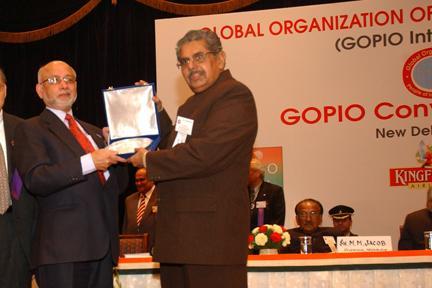
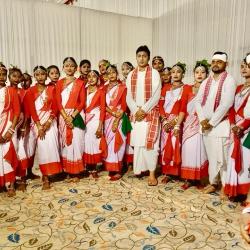







Comments
Add new comment